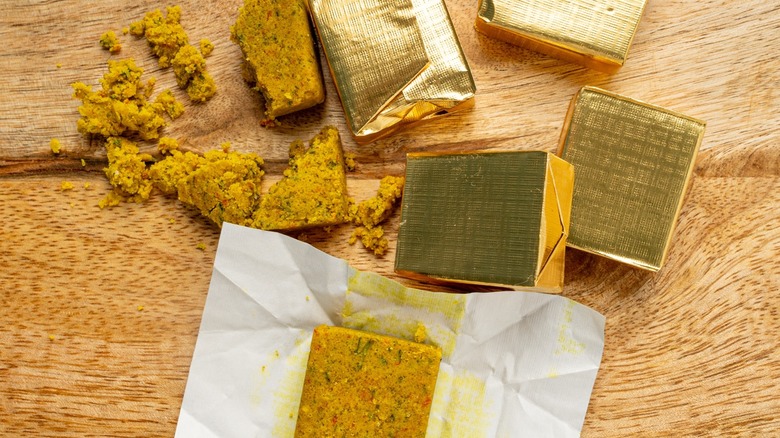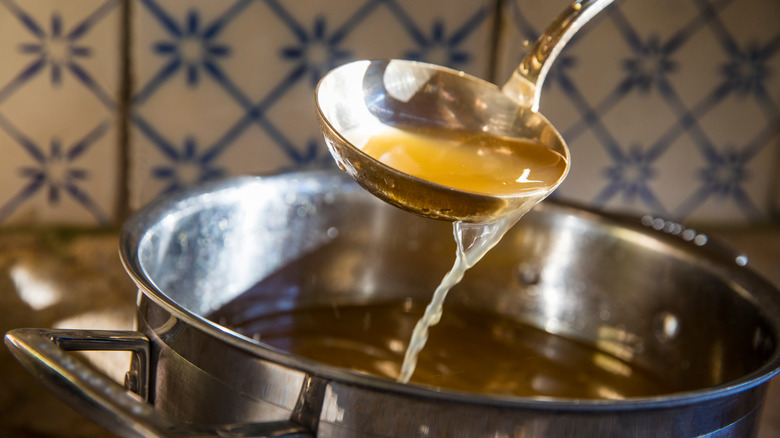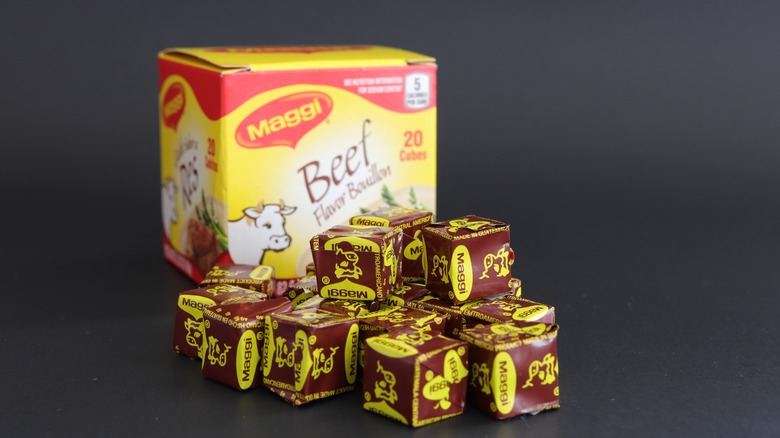Are Maggi Cubes The Same As Bouillon?
Bouillon cubes and powders are the ultimate culinary cheat code for soup enthusiasts and flavor-seekers alike. You can use these dehydrated broths or stocks to instantly turn hot water into a delicious soup base or infuse any recipe with a punch of umami flavor. It's hard to choose the best bouillon cubes and flavor bases for soup season since there are so many. It's difficult to parse the differences and figure out which one is right for your current culinary needs.
Knorr is probably the most well-known bouillon brand in the United States, but its ubiquity doesn't extend across the globe. In some areas, Maggi cubes are the key to distinct regional flavors and hold an important place in certain regional cuisines. Maggi cubes are a brand of bouillon that has a unique flavor profile distinct from other brands. So if a recipe calls for Maggi specifically, that's what you need. You can substitute another brand if that's what you have. It just won't taste the same.
Those familiar with Central or West African and Caribbean cooking are surely aware of Maggi's culinary significance. It's also used in Latin America and select European countries. And while others may have little frame of reference for the gold foil-wrapped flavor bombs, these cubes could transform your next recipe.
Bouillon means broth, usually in dehydrated form
The French word that lends its name to bouillon literally means "broth" and derives from the verb "bouillir," meaning "to boil." But outside France, bouillon is primarily used to refer to the dehydrated forms of seasoned meat and vegetable stocks that provide home cooks around the world a low-cost alternative to working over a boiling pot all day. Bouillon cubes are also shelf-stable, lasting for about two years in your pantry. That's superior to more perishable forms, given how long store-bought liquid broth lasts, which like the fresh broth is only a few days in the fridge.
Bouillon cubes typically consist of evaporated vegetable or meat stock with a high level of additional salt, monosodium glutamate (aka MSG), seasonings, and a small amount of fat and other thickening agents. Powdered bouillon is similar, simply packaging this substance in a loose powdered form rather than cubes.
While their original purpose was as an instant soup base, today, many recipes also utilize bouillon cubes or powders as a flavor additive in stews, sauces, stir-fries, rice, and meat dishes. Dehydrated bouillon has a history as a pantry staple worldwide, especially for working families and others cooking on a budget. Three European companies, Knorr, OXO, and Maggi, were at the forefront of mass-producing dried soup concentrates in the late 19th and early 20th centuries and continue to be popular bouillon brands to this day.
Maggi is bouillon, but it's also something special
Julius Maggi founded the Maggi company in Switzerland in the 1880s. The company's early products included dried pea soup and liquid seasoning, and in 1908, their first bouillon cubes entered the market. In 1947, Nestlé purchased the company and its international reach expanded even further.
Maggi is one of the best-known bouillon brands in the world, but its popularity is on another level in the Caribbean and parts of Africa. In West and Central Africa alone, the brand sells more than 100 million cubes daily, and people commonly use "maggi" or "maggie" to refer to bouillon cubes in general.
At their most basic, Maggi cubes are no different from any other bouillon cube, but they also contain seasonings like chili, cloves, cassava or fermented soybeans, and lovage (an herb with a celery-like flavor and hints of sweetness and anise). So if you can't find Maggi, you can substitute regular bouillon, but you may need to add something with some serious umami punch, such as Worcestershire sauce, tamari, or liquid aminos, to help you come closer to the real thing.


